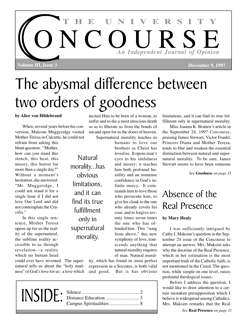Distance technology alone cannot provide a proper university education
by Anne Schmiesing
I have a few comments about Distance Education or Distance Learning, as Dr. Miletic calls it. In his discussion of the importance of written materials in the handing down of Catholic tradition, Dr. Miletic fails to include a discussion of the role of oral tradition. Certainly the written word, particularly Sacred Scripture, is extremely important in the handing down of Catholic tradition, but without the persons in the church hierarchy and the laity to help teach the truths of these works to others, by means of their words and their very lives, the written word would lay collecting dust. Not all of our Catholic tradition has been recorded. Nor could it be. Furthermore, Catholic tradition is much more than dissemination of doctrine; it is the diffusion of a spirituality or a way of life. That is dependent upon community and interpersonal contact. True education is also, much more than transferring knowledge; it is enculturation, touching much more than just the mind of students.
Dr. Miletic also speaks of the value of Distance Learning in theological studies for evangelization. Evangelization involves instilling enthusiasm for the faith and is much more than doctrinal teaching. In fact, mere doctrinal teaching is more properly called catechesis, which is often necessary for but not equivalent to evangelization. Evangelization can be accomplished, to some degree, across the centuries—as Dr. Miletic says—by the reading of a great work such as St. Augustine’s Confessions, or across great distances by means of books, cassettes or videos. However, I don’t believe such evangelization is as effective as face-to-face, personal interaction. Some people may be moved by reading or hearing a great Catholic work; however, without community support, the information gained by reading may be like the seeds fallen by the wayside, among weeds or on shallow, rocky soil; trampled, choked or dried by the sun. None of these seeds will produce viable plants. The culture at Franciscan University, however, can help “fertilize the soil,” so that the information students receive may bear fruit.
Information transmitted via e-mail, writing, or even phone, lacks full expression and enthusiasm. As Dr. Miletic says, a phone call or e-mail message is more than just words or letters transmitted; it is an actual encounter of a person and qualifies as interpersonal communication. This type of communication, though, is less personal, less embodied than Dr. Miletic implies. It cannot compare to going home on Christmas break after a semester away from family. An important part of evangelization or learning is enthusiasm for the topic, particularly the enthusiasm best conveyed in personal contact with professors and, crucially, with other students.
Certainly long distance phone calls and advances in technology such as e-mail and the internet can enhance education and ought to be used, but should not and could not adequately take the place of traditional education. A combination of all of these educational media is ideal. However, those who really are not able to participate in traditional education, I do not wish to deprive of the learning they might acquire through Distance Education. Is such education worthy of a degree, if so, what type of degree? Perhaps a new and separate, degree could be established to confer upon graduates of Distance Education.
Anne (Lodzinski, ‘96) Schmiesing and her husband Kevin (class of ‘94) live in Philadelphia. She is employed as Program Director for Pennslyvanians for Human Life, while Kevin completes a doctorate in history at the University of Pennsylvania. They have one son.


